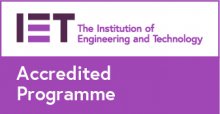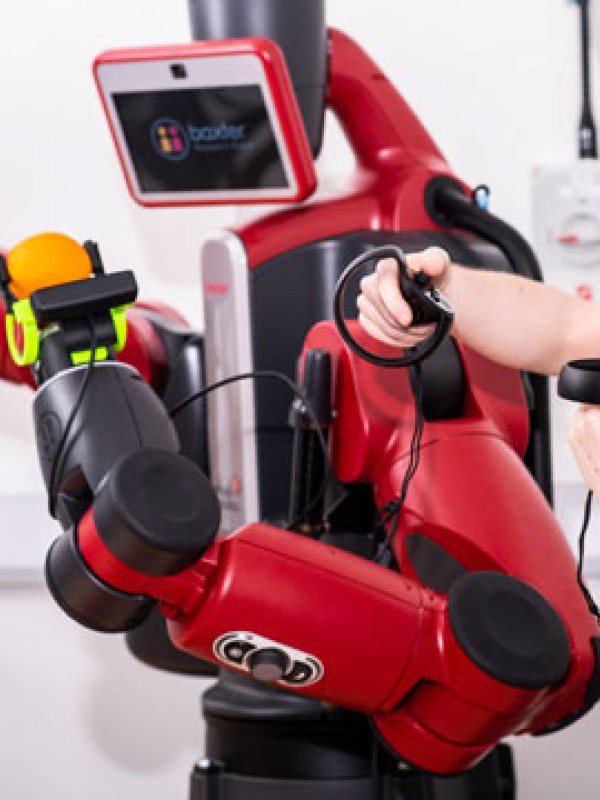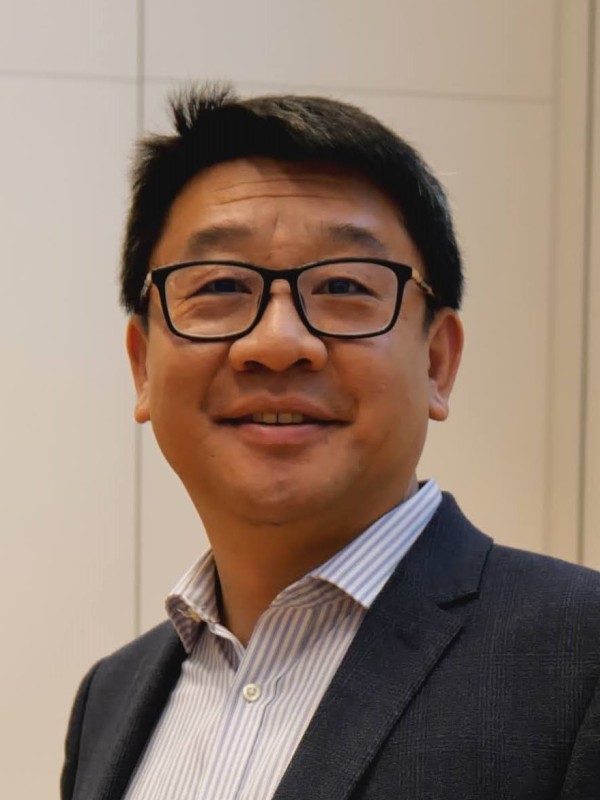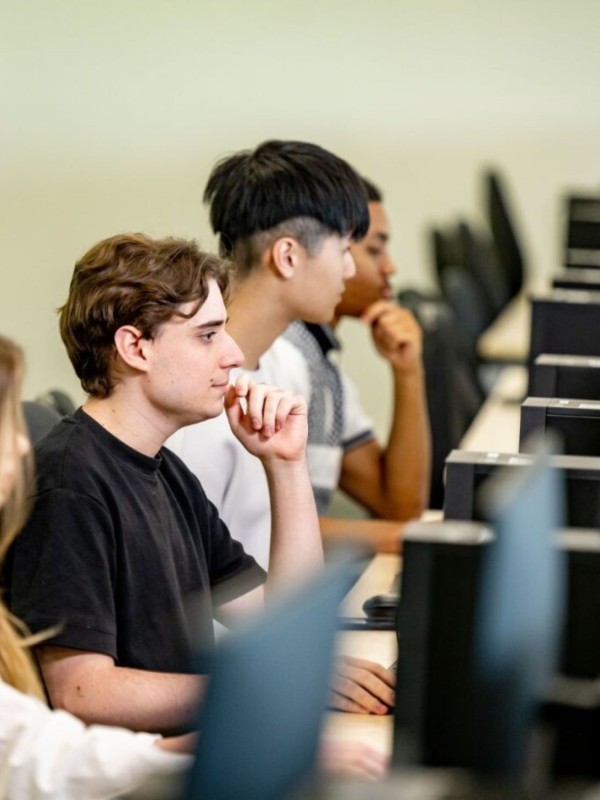
- Artificial Intelligence
MSc — 2026 entry Artificial Intelligence
Our Artificial Intelligence masters degree offers a comprehensive training in the theory, methods, and applications of artificial intelligence. This course will enable you to gain the practical skills and experience needed to pursue careers in AI research, development, and applications across various industries.
4,138+ people have created a bespoke digital prospectus
Why choose
this course?
Our Artificial Intelligence MSc stands apart as the sole programme of its kind in the UK. It draws on the profound knowledge of our pan-University Institute for People-Centred AI (PAI) and the Centre for Vision, Speech and Signal Processing (CVSSP), both top-ranked for AI research: No. 1 in the UK for computer vision.
This masters will teach you about fundamental AI concepts and the universal machine learning tools essential for any AI job role, as well as specific practical and research skills in key AI topics and applications. You’ll gain experience with cutting-edge tools such as deep neural networks (DNN), recurrent neural networks (RNN) and deep reinforcement learning (deep RL) through regular hands-on exercises and practical labs.
The growth of AI is rapidly changing the way we live, work and learn. However, there’s a real shortage of AI talent worldwide, both to serve the industry and to drive future research. Our Artificial Intelligence masters degree will enable you to capitalise on the wide spectrum of career opportunities provided by AI, preparing you to work in industry, take an entrepreneurial route or pursue further research.
And if you choose the placement pathway, you'll have the opportunity to undertake a postgraduate placement year, allowing you to gain crucial workplace experience. We’ll support you in finding a placement with a company most suited to your career goals.
Accreditation

What you will study
The course is designed to provide students with a comprehensive understanding of artificial intelligence (AI) by incorporating a wide range of core topics. On this course, you will study:
- Technical subjects, such as computer vision, natural language processing and audio analysis, to develop strong technical expertise
- Application-specific areas, such as health and the metaverse, to ensure you develop specialised knowledge in emerging AI fields
- Regulatory and legal aspects of AI, to equip you with a critical understanding of the ethical and legal considerations that will shape the future of AI.
The course consists of technical modules delivered by our School of Computer Science and Electronic Engineering, along with the opportunity to take related modules in business or law and ethics. You’ll also undertake a year-long project on an AI topic that interests you. You’ll be supervised throughout the project by an academic specialising in your chosen subject area.
Professional recognition
MSc - Institution of Engineering and Technology (IET)
Accredited by the Institution of Engineering and Technology (IET) on behalf of the Engineering Council for the purposes of fully meeting the academic requirement for registration as an Incorporated Engineer and partially meeting the academic requirement for registration as a Chartered Engineer.
Research
This degree draws on the pioneering knowledge of:
- The Surrey Institute for People-Centred AI (PAI), a pan-University institute that brings together world-leading AI and domain expertise across the University to realise and shape AI impact for public good.
- The Centre for Vision, Speech and Signal Processing (CVSSP), with more than 30 years of research experience in image processing, deep learning and machine intelligence.
- Our School of Computer Science and Electronic Engineering played a key part in Surrey being named one of nine universities in UK to be named Centre of Excellence in Cyber Security Education and Research*. The School was awarded Cyber University of the Year at the National Cyber Awards 2023.
*Awarded by the UK Government's National Cyber Security Centre
Facilities
Several of the modules you’ll study are complemented by software-based laboratory sessions. From these, you’ll complete your coursework. This is an important part of your MSc, enhancing your knowledge in preparation for the written examinations. We’ll provide you with computing support for any specialised software required during the course.
The faculty’s student common room is also covered by the University’s open-access wireless network, which makes it a popular location for individual and group work using laptops and mobile devices.
Specialist experimental and research facilities (e.g. graphics processing unit clusters) for computationally demanding projects or those requiring specialist equipment are provided by our Centre for Vision, Speech and Signal Processing.
If you’re studying this course full-time, you’ll study eight modules across the year – four in each semester. You will work on your project full-time during the summer period for approximately two-and-a-half months, and prior to that, during semester time, you will work on the initial stages of the project part-time and complete an interim report. This means that if you begin your course in February, you will complete your project in between the two semesters, and if you begin your course in September, you will complete your project after the two semesters.
You can also study this MSc part-time, taking between two and five years. You can study between two and six modules each year and the length taken to complete the MSc depends on how many modules you choose. We recommend part-time students work on their project in their final year of study when all eight modules either have been completed or are near completion.
The structure of our programmes follows clear educational aims that are tailored to each programme. These are all outlined in the programme specifications which include further details such as the learning outcomes:
Modules
Modules listed are indicative, reflecting the information available at the time of publication. Modules are subject to teaching availability, student demand and/or class size caps.
The University operates a credit framework for all taught programmes based on a 15-credit tariff, meaning all modules are comprised of multiples of 15 credits.
Course options
Year 1
Semester 1
Compulsory
Module purpose: This course offers an introduction to machine learning for those interested in the science and technology of Artificial Intelligence (AI). It provides background and the theory for building fundamental artificial systems that can process a variety of data and analyse their semantic information of interest. This is implemented by various fundamental learning algorithms that will be discussed and demonstrated in an easy-to-approach manner.
View full module detailsThis module offers an introduction to the use of AI in society, work, media and communication, government and policy. It puts people ¿ as opposed to technology -- in the centre of AI, and highlights core considerations in planning for AI applications as a response to issues and considerations in the society. This is done by exploring varied positions of users and stakeholders in relation to AI, examining the suitability of AI and associated tools and methods to the productivity/progress/propagation in society. In this module we discuss the opportunities, but also the challenges, risks, threats and ethical implications involved in the use of AI in society.
View full module detailsOptional
Expected prior learning: Module EEE2041 – Computer Vision & Graphics, or equivalent learning about the geometric interpretation of Linear Algebra (e.g. homogeneous coordinates and matrices for point transformation e.g. rotation, translation, scaling). Module purpose: The module delivers a grounding in Computer Vision, suitable for students with a grounding in linear algebra similar to that provided by EEE2041 – Computer Vision & Graphics) and will help with modules such EEEM071 Advanced Topics in Computer Vision and Deep Learning. Content is presented as an application-focused tour of Computer Vision from the low-level (image processing), through to high level model fitting and object recognition.
View full module detailsExpected prior learning: Module EEE3008–Fundamentals of Digital Signal Processing or equivalent learning about signal processing. Module purpose: The module discusses basic concepts, signal processing methods and human computer interaction applications of speech processing and recognition including auditory perception and psychoacoustics. You will be taught how to extract salient features from speech signals, how to design a model of spoken language, how to perform recognition and training, and given an insight into current research on spontaneous speech recognition, such as speaker adaptation and solutions for robustness to noise. Demonstrations, interesting illustrations and working examples will be given. Successful students can either proceed to do PhDs or get jobs in the R & D departments of industry, i.e. jobs that are at a higher level than mere software package operators. The presented techniques have many other applications beyond speech, including expert systems and financial modelling. Module EEEM030 contributes to the development of student’s knowledge in audio and speech processing and recognition, which may be useful for their taking of other modules such as: EEEM071 Advanced Topics in Computer Vision and Deep Learning EEEM004 60 Credit Standard Project EEEM005 AI and AI Programming EEEM066 Fundamentals of Machine Learning EEEM067 AR, VR and Metaverse EEEM068 Applied Machine Learning Module EEEM030 contributes to student knowledge in audio and speech processing and thus useful for students taking 60 credit project (EEEM004) related to audio and speech processing and recognition. EEEM030 is related to EEEM005, EEEM066 and EEEM068 due to the fact that machine learning/AI techniques are used for speech and speaker recognition, therefore, EEEM030 contributes to the development of student knowledge in machine learning/AI, which is beneficial for their taking of machine learning and AI related modules such as EEEM005, EEEM066 and EEEM068. One of the applications of audio and speech processing is to apply it to AR, VR and Metaverse for spatial sound production and reproduction which is a key enabling technology for AR, VR, and Metaverse, for virtual sound reproduction. Therefore, knowledge gained from EEEM030 would be useful for the taking of the module EEEM067. Module EEE030 also benefits from knowledge gained from other modules such as: EEE3008 Digital Signal Processing EEE1033 Computer and Digital Logic EEE1035 Programming in C EEE3042 Audio and Video Processing EEE3032 Computer Vision and Pattern Recognition The modules EEE1033 and EEE1035 provide students with some useful skills in programming, which will be beneficial for them to complete the computer programming based coursework components, by turning the signal processing theories and methods into working program codes. The module EEE3008 provides students with knowledge and skills on fundamental digital signal processing skills which are essential in understanding the application of these skills to audio and speech data. EEE3042 covers both audio and video processing and coding, and the audio related materials are highly relevant and thus useful for the EEEM030 module. The pattern recognition skills gained from EEE3032 would be useful for understanding the use of pattern recognition algorithms to speech data for achieving speech and speaker recognition.
View full module detailsThis module introduces the students to the key ethical and regulatory issues associated with artificial intelligence, as well as to the methods of analysis of those issues used in ethics and in law. The focus of the module is on the current state of the art in the applications of artificial intelligence (in particular: of machine learning), with smaller emphasis on hypothetical future developments. The module makes use of the case study method to introduce students to ethical and regulatory (legal) questions through discussion of relevant major incidents from recent years. The module helps students develop their thinking on how to translate abstract ethical (and regulatory) requirements of fairness, explainability or privacy into engineering and business practice.
View full module detailsThis module will introduce and explore the underlying concepts and technologies of virtual/augmented reality (VR/AR) and the emerging idea of the Metaverse. The module will also investigate the current and future challenges of the technologies and consider the impact it will have on industry and wider society.
View full module detailsSemester 2
Compulsory
Machine/Deep learning has emerged from computer science and artificial intelligence. It draws on methods from a variety of related subjects including statistics, applied mathematics and more specialized fields, such as pattern recognition and neural network computation. This module offers the theory and related applications of advanced deep/machine learning topics and an overview their applications to other fields, such as natural language processing, medical imaging, health, audio, and fintech etc. The deep learning algorithms which will be studied are used widely in industry by AI start-ups to AI tech giants, like, Google, Meta, Microsoft, Amazon, Tesla etc. It provides a background and related theory of deep/machine learning to manipulate data from various domains like image, video, text, audio etc. This is done by various machine learning algorithms that are discussed, implemented, and demonstrated within the module.
View full module detailsCore
This module is aimed at forming essential professional skills and competences in research and innovation for master level students studying in programmes relating to computer science and/or electronic engineering. It will therefore serve as an important initial module towards planning and executing the dissertation project through learning about literature reviewing and research methodologies. Furthermore, it will facilitate team building skills through identifying individual strengths and exercising capability through group design work. This experience will also make the student aware of the challenges of working effectively with other people.
View full module detailsOptional
This module introduces students to some of the basic ideas and concepts that underlie the development of artificially intelligent machine systems. Teaches core AI materials for problem solving (search, logic, probabilistic methods, Perceptrons as the building block for ANNs) Focuses on core understanding and problem solving: suitable tools/methods for a problem using problem classes Provides a clear understanding of neural networks, back-propagation, RBFs, ANN learning and optimisation Provides a clear understanding of intelligent agents via search methods and introducing cost functions Provides a clear understanding of Bayes’ Rule, conditional probability and uncertainty reasoning Provides a clear understanding of knowledge capture, symbolic knowledge representation and logical reasoning from antiquity to Boule to first order predicate rules and representations. Provides opportunity to implement concepts during coursework.
View full module detailsModule purpose: This course offers an introduction to image processing and computer vision for those interested in the science and technology of machine vision. It provides background and the theory for building artificial systems that manipulate videos and images and alter or analyse their information content. This is done by various computer algorithms that are discussed, implemented and demonstrated.
View full module detailsThe module provides an application-focused tour of machine learning for real-world healthcare research and application from understanding various healthcare components, ethical concerns to pre-processing and analysing healthcare data for classification, survival and risk analysis, and early prediction tasks. The module requires and builds on the knowledge of basic machine learning, linear algebra, and familiarity with Python programming. Labs are designed to support understanding of the theory and enable development of practical skills required for future employability.
View full module detailsThis module will demonstrate fundamental concepts from the field of Natural Language Processing (NLP) and Computational Linguistics. It will also discuss some of the latest advances in NLP and Generative Artificial Intelligence with a focus on Language Models like BERT, T5, and GPT, and get student up to speed with current research. It will provide the necessary skills to enable students to build computational models for solving a range of problems, such as text classification, sequence classification, machine translation and building conversation agents. The students will learn how to build NLP pipelines for preparing training data and choosing appropriate algorithms and techniques to build such models. The module also focuses on aspects of ethical and trustworthy artificial intelligence with discussion on rigorous model evaluation and ethical considerations for computational modeling. Although traditional linguistic approaches will be mentioned, majority emphasis will be put on the state-of-the-art Deep Learning algorithms and Transfer Learning methods for building efficient and trustworthy NLP solutions.
View full module detailsRecently, Artificial Intelligence (AI) has been playing a key role in the research and development of scientific and technological breakthroughs in many disciplines to solve real world problems, providing new foundations and steppingstones to foster more advances and solutions. In this context, AI has a great potential to play a transformative role in helping to achieve the United Nations Sustainable Development Goals (UNSDG), by providing new insights, enabling more efficient use of resources, and supporting a better understanding of complex systems that underpin the dynamics of people's lives and the planet's environment. Therefore, the purpose of this module is to present the key concepts with practical applications related to the development of more sustainable AI techniques (e.g. model, data and energy efficiency, bias and unfairness identification and mitigation, trustworthy AI, physics-informed neural networks etc.), and AI solutions to support UNSDGs (e.g. clean air, clean energy, clean water, waste management, smart manufacturing etc.).
View full module detailsSemester 1 & 2
Core
Expected prior learning: Appropriate background knowledge related to the project topic. Module purpose: This is an individual student project module giving each masters student an opportunity to gain realistic experience in developing a solution to a problem from its inception to a demonstrable result. It provides a framework as well as a vehicle for exercising all key aspects of project work, from project specification, through literature and technology research, leading to project planning, problem solving as well as design and implementation, culminating in performance assessment, project demonstration, and project evaluation. It also provides a scope for gaining practical experience interpersonal skills, use of IT, project management, project reporting and project presentation. The project can be either of engineering design nature or have a research flavour. This module is complementary to all other taught modules in order to apply the learning gained into undertaking an independent piece of research and/or development.
View full module detailsOptional modules for Year 1 - FHEQ Levels 6 and 7
Two optional modules in semester 1
Two optional modules in semester 2
Year 1
Semester 1
Compulsory
Module purpose: This course offers an introduction to machine learning for those interested in the science and technology of Artificial Intelligence (AI). It provides background and the theory for building fundamental artificial systems that can process a variety of data and analyse their semantic information of interest. This is implemented by various fundamental learning algorithms that will be discussed and demonstrated in an easy-to-approach manner.
View full module detailsThis module offers an introduction to the use of AI in society, work, media and communication, government and policy. It puts people ¿ as opposed to technology -- in the centre of AI, and highlights core considerations in planning for AI applications as a response to issues and considerations in the society. This is done by exploring varied positions of users and stakeholders in relation to AI, examining the suitability of AI and associated tools and methods to the productivity/progress/propagation in society. In this module we discuss the opportunities, but also the challenges, risks, threats and ethical implications involved in the use of AI in society.
View full module detailsOptional
Expected prior learning: Module EEE2041 – Computer Vision & Graphics, or equivalent learning about the geometric interpretation of Linear Algebra (e.g. homogeneous coordinates and matrices for point transformation e.g. rotation, translation, scaling). Module purpose: The module delivers a grounding in Computer Vision, suitable for students with a grounding in linear algebra similar to that provided by EEE2041 – Computer Vision & Graphics) and will help with modules such EEEM071 Advanced Topics in Computer Vision and Deep Learning. Content is presented as an application-focused tour of Computer Vision from the low-level (image processing), through to high level model fitting and object recognition.
View full module detailsExpected prior learning: Module EEE3008–Fundamentals of Digital Signal Processing or equivalent learning about signal processing. Module purpose: The module discusses basic concepts, signal processing methods and human computer interaction applications of speech processing and recognition including auditory perception and psychoacoustics. You will be taught how to extract salient features from speech signals, how to design a model of spoken language, how to perform recognition and training, and given an insight into current research on spontaneous speech recognition, such as speaker adaptation and solutions for robustness to noise. Demonstrations, interesting illustrations and working examples will be given. Successful students can either proceed to do PhDs or get jobs in the R & D departments of industry, i.e. jobs that are at a higher level than mere software package operators. The presented techniques have many other applications beyond speech, including expert systems and financial modelling. Module EEEM030 contributes to the development of student’s knowledge in audio and speech processing and recognition, which may be useful for their taking of other modules such as: EEEM071 Advanced Topics in Computer Vision and Deep Learning EEEM004 60 Credit Standard Project EEEM005 AI and AI Programming EEEM066 Fundamentals of Machine Learning EEEM067 AR, VR and Metaverse EEEM068 Applied Machine Learning Module EEEM030 contributes to student knowledge in audio and speech processing and thus useful for students taking 60 credit project (EEEM004) related to audio and speech processing and recognition. EEEM030 is related to EEEM005, EEEM066 and EEEM068 due to the fact that machine learning/AI techniques are used for speech and speaker recognition, therefore, EEEM030 contributes to the development of student knowledge in machine learning/AI, which is beneficial for their taking of machine learning and AI related modules such as EEEM005, EEEM066 and EEEM068. One of the applications of audio and speech processing is to apply it to AR, VR and Metaverse for spatial sound production and reproduction which is a key enabling technology for AR, VR, and Metaverse, for virtual sound reproduction. Therefore, knowledge gained from EEEM030 would be useful for the taking of the module EEEM067. Module EEE030 also benefits from knowledge gained from other modules such as: EEE3008 Digital Signal Processing EEE1033 Computer and Digital Logic EEE1035 Programming in C EEE3042 Audio and Video Processing EEE3032 Computer Vision and Pattern Recognition The modules EEE1033 and EEE1035 provide students with some useful skills in programming, which will be beneficial for them to complete the computer programming based coursework components, by turning the signal processing theories and methods into working program codes. The module EEE3008 provides students with knowledge and skills on fundamental digital signal processing skills which are essential in understanding the application of these skills to audio and speech data. EEE3042 covers both audio and video processing and coding, and the audio related materials are highly relevant and thus useful for the EEEM030 module. The pattern recognition skills gained from EEE3032 would be useful for understanding the use of pattern recognition algorithms to speech data for achieving speech and speaker recognition.
View full module detailsThis module will introduce and explore the underlying concepts and technologies of virtual/augmented reality (VR/AR) and the emerging idea of the Metaverse. The module will also investigate the current and future challenges of the technologies and consider the impact it will have on industry and wider society.
View full module detailsThis module introduces the students to the key ethical and regulatory issues associated with artificial intelligence, as well as to the methods of analysis of those issues used in ethics and in law. The focus of the module is on the current state of the art in the applications of artificial intelligence (in particular: of machine learning), with smaller emphasis on hypothetical future developments. The module makes use of the case study method to introduce students to ethical and regulatory (legal) questions through discussion of relevant major incidents from recent years. The module helps students develop their thinking on how to translate abstract ethical (and regulatory) requirements of fairness, explainability or privacy into engineering and business practice.
View full module detailsSemester 2
Compulsory
Machine/Deep learning has emerged from computer science and artificial intelligence. It draws on methods from a variety of related subjects including statistics, applied mathematics and more specialized fields, such as pattern recognition and neural network computation. This module offers the theory and related applications of advanced deep/machine learning topics and an overview their applications to other fields, such as natural language processing, medical imaging, health, audio, and fintech etc. The deep learning algorithms which will be studied are used widely in industry by AI start-ups to AI tech giants, like, Google, Meta, Microsoft, Amazon, Tesla etc. It provides a background and related theory of deep/machine learning to manipulate data from various domains like image, video, text, audio etc. This is done by various machine learning algorithms that are discussed, implemented, and demonstrated within the module.
View full module detailsCore
This module is aimed at forming essential professional skills and competences in research and innovation for master level students studying in programmes relating to computer science and/or electronic engineering. It will therefore serve as an important initial module towards planning and executing the dissertation project through learning about literature reviewing and research methodologies. Furthermore, it will facilitate team building skills through identifying individual strengths and exercising capability through group design work. This experience will also make the student aware of the challenges of working effectively with other people.
View full module detailsOptional
This module will demonstrate fundamental concepts from the field of Natural Language Processing (NLP) and Computational Linguistics. It will also discuss some of the latest advances in NLP and Generative Artificial Intelligence with a focus on Language Models like BERT, T5, and GPT, and get student up to speed with current research. It will provide the necessary skills to enable students to build computational models for solving a range of problems, such as text classification, sequence classification, machine translation and building conversation agents. The students will learn how to build NLP pipelines for preparing training data and choosing appropriate algorithms and techniques to build such models. The module also focuses on aspects of ethical and trustworthy artificial intelligence with discussion on rigorous model evaluation and ethical considerations for computational modeling. Although traditional linguistic approaches will be mentioned, majority emphasis will be put on the state-of-the-art Deep Learning algorithms and Transfer Learning methods for building efficient and trustworthy NLP solutions.
View full module detailsThis module introduces students to some of the basic ideas and concepts that underlie the development of artificially intelligent machine systems. Teaches core AI materials for problem solving (search, logic, probabilistic methods, Perceptrons as the building block for ANNs) Focuses on core understanding and problem solving: suitable tools/methods for a problem using problem classes Provides a clear understanding of neural networks, back-propagation, RBFs, ANN learning and optimisation Provides a clear understanding of intelligent agents via search methods and introducing cost functions Provides a clear understanding of Bayes’ Rule, conditional probability and uncertainty reasoning Provides a clear understanding of knowledge capture, symbolic knowledge representation and logical reasoning from antiquity to Boule to first order predicate rules and representations. Provides opportunity to implement concepts during coursework.
View full module detailsThe module provides an application-focused tour of machine learning for real-world healthcare research and application from understanding various healthcare components, ethical concerns to pre-processing and analysing healthcare data for classification, survival and risk analysis, and early prediction tasks. The module requires and builds on the knowledge of basic machine learning, linear algebra, and familiarity with Python programming. Labs are designed to support understanding of the theory and enable development of practical skills required for future employability.
View full module detailsModule purpose: This course offers an introduction to image processing and computer vision for those interested in the science and technology of machine vision. It provides background and the theory for building artificial systems that manipulate videos and images and alter or analyse their information content. This is done by various computer algorithms that are discussed, implemented and demonstrated.
View full module detailsRecently, Artificial Intelligence (AI) has been playing a key role in the research and development of scientific and technological breakthroughs in many disciplines to solve real world problems, providing new foundations and steppingstones to foster more advances and solutions. In this context, AI has a great potential to play a transformative role in helping to achieve the United Nations Sustainable Development Goals (UNSDG), by providing new insights, enabling more efficient use of resources, and supporting a better understanding of complex systems that underpin the dynamics of people's lives and the planet's environment. Therefore, the purpose of this module is to present the key concepts with practical applications related to the development of more sustainable AI techniques (e.g. model, data and energy efficiency, bias and unfairness identification and mitigation, trustworthy AI, physics-informed neural networks etc.), and AI solutions to support UNSDGs (e.g. clean air, clean energy, clean water, waste management, smart manufacturing etc.).
View full module detailsSemester 1 & 2
Compulsory
This module provides information, guidance and support for developing the student¿s employability.In addition, this module helps students build on their previous skills and generate documents that are required to demonstrate their skill sets to external parties, recruiters and recruiting agencies. Furthermore, skills acquired in this module will enable students to actively participate in placement and employment searches.
View full module detailsCore
Expected prior learning: Appropriate background knowledge related to the project topic. Module purpose: This is an individual student project module giving each masters student an opportunity to gain realistic experience in developing a solution to a problem from its inception to a demonstrable result. It provides a framework as well as a vehicle for exercising all key aspects of project work, from project specification, through literature and technology research, leading to project planning, problem solving as well as design and implementation, culminating in performance assessment, project demonstration, and project evaluation. It also provides a scope for gaining practical experience interpersonal skills, use of IT, project management, project reporting and project presentation. The project can be either of engineering design nature or have a research flavour. This module is complementary to all other taught modules in order to apply the learning gained into undertaking an independent piece of research and/or development.
View full module detailsAcross academic years
Compulsory
This module provides information, guidance and support for developing the student¿s employability.In addition, this module helps students build on their previous skills and generate documents that are required to demonstrate their skill sets to external parties, recruiters and recruiting agencies. Furthermore, skills acquired in this module will enable students to actively participate in placement and employment searches.
View full module detailsOptional modules for Year 1 (full-time with placement - 2 years) - FHEQ Level 7
Students must select two optional modules in Semester 1 and two optional modules in Semester 2
Year 2
Across academic years
Compulsory
This module provides a portfolio of professional development appropriate to the expectations of the graduate's technical discipline. The module will include developing the ability to interrogate theoretical knowledge learned at the university with applied professional skills and maximise the potential to succeed in the global job market. The Industrial placement is an excellent opportunity to explore and practice reflective and experiential learning by promoting reflection on the development of professional skills and critical thinking about the ways to improve these. Reflection, critical thinking, and analytical skills will be developed during the placement and while writing the report.
View full module detailsOptional modules for Year 2 (full-time with placement - 2 years) - FHEQ Level 7
Unstructured years
Semester 1
Compulsory
Module purpose: This course offers an introduction to machine learning for those interested in the science and technology of Artificial Intelligence (AI). It provides background and the theory for building fundamental artificial systems that can process a variety of data and analyse their semantic information of interest. This is implemented by various fundamental learning algorithms that will be discussed and demonstrated in an easy-to-approach manner.
View full module detailsThis module offers an introduction to the use of AI in society, work, media and communication, government and policy. It puts people ¿ as opposed to technology -- in the centre of AI, and highlights core considerations in planning for AI applications as a response to issues and considerations in the society. This is done by exploring varied positions of users and stakeholders in relation to AI, examining the suitability of AI and associated tools and methods to the productivity/progress/propagation in society. In this module we discuss the opportunities, but also the challenges, risks, threats and ethical implications involved in the use of AI in society.
View full module detailsOptional
Expected prior learning: Module EEE2041 – Computer Vision & Graphics, or equivalent learning about the geometric interpretation of Linear Algebra (e.g. homogeneous coordinates and matrices for point transformation e.g. rotation, translation, scaling). Module purpose: The module delivers a grounding in Computer Vision, suitable for students with a grounding in linear algebra similar to that provided by EEE2041 – Computer Vision & Graphics) and will help with modules such EEEM071 Advanced Topics in Computer Vision and Deep Learning. Content is presented as an application-focused tour of Computer Vision from the low-level (image processing), through to high level model fitting and object recognition.
View full module detailsExpected prior learning: Module EEE3008–Fundamentals of Digital Signal Processing or equivalent learning about signal processing. Module purpose: The module discusses basic concepts, signal processing methods and human computer interaction applications of speech processing and recognition including auditory perception and psychoacoustics. You will be taught how to extract salient features from speech signals, how to design a model of spoken language, how to perform recognition and training, and given an insight into current research on spontaneous speech recognition, such as speaker adaptation and solutions for robustness to noise. Demonstrations, interesting illustrations and working examples will be given. Successful students can either proceed to do PhDs or get jobs in the R & D departments of industry, i.e. jobs that are at a higher level than mere software package operators. The presented techniques have many other applications beyond speech, including expert systems and financial modelling. Module EEEM030 contributes to the development of student’s knowledge in audio and speech processing and recognition, which may be useful for their taking of other modules such as: EEEM071 Advanced Topics in Computer Vision and Deep Learning EEEM004 60 Credit Standard Project EEEM005 AI and AI Programming EEEM066 Fundamentals of Machine Learning EEEM067 AR, VR and Metaverse EEEM068 Applied Machine Learning Module EEEM030 contributes to student knowledge in audio and speech processing and thus useful for students taking 60 credit project (EEEM004) related to audio and speech processing and recognition. EEEM030 is related to EEEM005, EEEM066 and EEEM068 due to the fact that machine learning/AI techniques are used for speech and speaker recognition, therefore, EEEM030 contributes to the development of student knowledge in machine learning/AI, which is beneficial for their taking of machine learning and AI related modules such as EEEM005, EEEM066 and EEEM068. One of the applications of audio and speech processing is to apply it to AR, VR and Metaverse for spatial sound production and reproduction which is a key enabling technology for AR, VR, and Metaverse, for virtual sound reproduction. Therefore, knowledge gained from EEEM030 would be useful for the taking of the module EEEM067. Module EEE030 also benefits from knowledge gained from other modules such as: EEE3008 Digital Signal Processing EEE1033 Computer and Digital Logic EEE1035 Programming in C EEE3042 Audio and Video Processing EEE3032 Computer Vision and Pattern Recognition The modules EEE1033 and EEE1035 provide students with some useful skills in programming, which will be beneficial for them to complete the computer programming based coursework components, by turning the signal processing theories and methods into working program codes. The module EEE3008 provides students with knowledge and skills on fundamental digital signal processing skills which are essential in understanding the application of these skills to audio and speech data. EEE3042 covers both audio and video processing and coding, and the audio related materials are highly relevant and thus useful for the EEEM030 module. The pattern recognition skills gained from EEE3032 would be useful for understanding the use of pattern recognition algorithms to speech data for achieving speech and speaker recognition.
View full module detailsThis module introduces the students to the key ethical and regulatory issues associated with artificial intelligence, as well as to the methods of analysis of those issues used in ethics and in law. The focus of the module is on the current state of the art in the applications of artificial intelligence (in particular: of machine learning), with smaller emphasis on hypothetical future developments. The module makes use of the case study method to introduce students to ethical and regulatory (legal) questions through discussion of relevant major incidents from recent years. The module helps students develop their thinking on how to translate abstract ethical (and regulatory) requirements of fairness, explainability or privacy into engineering and business practice.
View full module detailsThis module will introduce and explore the underlying concepts and technologies of virtual/augmented reality (VR/AR) and the emerging idea of the Metaverse. The module will also investigate the current and future challenges of the technologies and consider the impact it will have on industry and wider society.
View full module detailsSemester 2
Compulsory
Machine/Deep learning has emerged from computer science and artificial intelligence. It draws on methods from a variety of related subjects including statistics, applied mathematics and more specialized fields, such as pattern recognition and neural network computation. This module offers the theory and related applications of advanced deep/machine learning topics and an overview their applications to other fields, such as natural language processing, medical imaging, health, audio, and fintech etc. The deep learning algorithms which will be studied are used widely in industry by AI start-ups to AI tech giants, like, Google, Meta, Microsoft, Amazon, Tesla etc. It provides a background and related theory of deep/machine learning to manipulate data from various domains like image, video, text, audio etc. This is done by various machine learning algorithms that are discussed, implemented, and demonstrated within the module.
View full module detailsCore
This module is aimed at forming essential professional skills and competences in research and innovation for master level students studying in programmes relating to computer science and/or electronic engineering. It will therefore serve as an important initial module towards planning and executing the dissertation project through learning about literature reviewing and research methodologies. Furthermore, it will facilitate team building skills through identifying individual strengths and exercising capability through group design work. This experience will also make the student aware of the challenges of working effectively with other people.
View full module detailsOptional
This module introduces students to some of the basic ideas and concepts that underlie the development of artificially intelligent machine systems. Teaches core AI materials for problem solving (search, logic, probabilistic methods, Perceptrons as the building block for ANNs) Focuses on core understanding and problem solving: suitable tools/methods for a problem using problem classes Provides a clear understanding of neural networks, back-propagation, RBFs, ANN learning and optimisation Provides a clear understanding of intelligent agents via search methods and introducing cost functions Provides a clear understanding of Bayes’ Rule, conditional probability and uncertainty reasoning Provides a clear understanding of knowledge capture, symbolic knowledge representation and logical reasoning from antiquity to Boule to first order predicate rules and representations. Provides opportunity to implement concepts during coursework.
View full module detailsModule purpose: This course offers an introduction to image processing and computer vision for those interested in the science and technology of machine vision. It provides background and the theory for building artificial systems that manipulate videos and images and alter or analyse their information content. This is done by various computer algorithms that are discussed, implemented and demonstrated.
View full module detailsThe module provides an application-focused tour of machine learning for real-world healthcare research and application from understanding various healthcare components, ethical concerns to pre-processing and analysing healthcare data for classification, survival and risk analysis, and early prediction tasks. The module requires and builds on the knowledge of basic machine learning, linear algebra, and familiarity with Python programming. Labs are designed to support understanding of the theory and enable development of practical skills required for future employability.
View full module detailsThis module will demonstrate fundamental concepts from the field of Natural Language Processing (NLP) and Computational Linguistics. It will also discuss some of the latest advances in NLP and Generative Artificial Intelligence with a focus on Language Models like BERT, T5, and GPT, and get student up to speed with current research. It will provide the necessary skills to enable students to build computational models for solving a range of problems, such as text classification, sequence classification, machine translation and building conversation agents. The students will learn how to build NLP pipelines for preparing training data and choosing appropriate algorithms and techniques to build such models. The module also focuses on aspects of ethical and trustworthy artificial intelligence with discussion on rigorous model evaluation and ethical considerations for computational modeling. Although traditional linguistic approaches will be mentioned, majority emphasis will be put on the state-of-the-art Deep Learning algorithms and Transfer Learning methods for building efficient and trustworthy NLP solutions.
View full module detailsRecently, Artificial Intelligence (AI) has been playing a key role in the research and development of scientific and technological breakthroughs in many disciplines to solve real world problems, providing new foundations and steppingstones to foster more advances and solutions. In this context, AI has a great potential to play a transformative role in helping to achieve the United Nations Sustainable Development Goals (UNSDG), by providing new insights, enabling more efficient use of resources, and supporting a better understanding of complex systems that underpin the dynamics of people's lives and the planet's environment. Therefore, the purpose of this module is to present the key concepts with practical applications related to the development of more sustainable AI techniques (e.g. model, data and energy efficiency, bias and unfairness identification and mitigation, trustworthy AI, physics-informed neural networks etc.), and AI solutions to support UNSDGs (e.g. clean air, clean energy, clean water, waste management, smart manufacturing etc.).
View full module detailsSemester 1 & 2
Core
Expected prior learning: Appropriate background knowledge related to the project topic. Module purpose: This is an individual student project module giving each masters student an opportunity to gain realistic experience in developing a solution to a problem from its inception to a demonstrable result. It provides a framework as well as a vehicle for exercising all key aspects of project work, from project specification, through literature and technology research, leading to project planning, problem solving as well as design and implementation, culminating in performance assessment, project demonstration, and project evaluation. It also provides a scope for gaining practical experience interpersonal skills, use of IT, project management, project reporting and project presentation. The project can be either of engineering design nature or have a research flavour. This module is complementary to all other taught modules in order to apply the learning gained into undertaking an independent piece of research and/or development.
View full module detailsOptional modules for Unstructured (3-5 years) PT - FHEQ Levels 6 and 7
Two optional modules in semester 1
Two optional modules in semester 2
Teaching and learning
Our MSc is developed and delivered by academics with unrivalled experience, including:
- Professor Adrian Hilton: Fellow of the Royal Academy of Engineering, who has successfully commercialised 4D computer vision techniques used across entertainment, manufacturing and healthcare
- Professor Josef Kittler: A Distinguished Professor at Surrey, Fellow of the Royal Academy of Engineering, pioneer of modern machine learning and founder of CVSSP
- Professor Tao Xiang: A Distinguished Professor at Surrey and Chief Scientist at Samsung AI Research Centre, Cambridge.
General course information
Contact hours
Contact hours can vary across our modules. Full details of the contact hours for each module are available from the University of Surrey's module catalogue. See the modules section for more information.
Timetable
New students will receive their personalised timetable during Welcome Week. In later semesters, at least one week before the start of the semester.
Scheduled teaching can take place on any day of the week (Monday – Friday), with part-time classes normally scheduled for one or two days. Wednesday afternoons tend to be for sports and cultural activities.
View our code of practice for the scheduling of teaching and assessment (PDF) for more information.
Location
This course is based at Stag Hill campus. Stag Hill is the University's main campus and where the majority of our courses are taught.
We offer careers information, advice and guidance to all students whilst studying with us, which is extended to our alumni for three years after leaving the University.
Our graduates have a wealth of opportunities in AI-driven businesses such as Google, Facebook, Amazon and Samsung, as well as roles in the mobile and gaming industries.
More specifically, our Artificial Intelligence masters degree will equip you for roles such as:
- AI scientist at a global technology company (e.g. Facebook, Google, Samsung)
- AI analyst in finance/banking and other jobs requiring a systematic understanding of AI
- Entrepreneurial roles (e.g. business start-ups focused on AI technology)
- Industry-sponsored PhD studentship at the cutting edge of AI research.


Chaitat U.
Graduate - Artificial Intelligence MSc


Yash Kulthe
Student - Artificial Intelligence MSc
UK qualifications
A minimum of a 2:2 UK honours degree in communication engineering, computer engineering, computer science, electronic and computer engineering, electronic engineering, information and communication technologies, information systems engineering, maths, physics, telecommunication engineering, or a recognised equivalent international qualification.
We'll also consider relevant work experience if you don't meet these requirements.
English language requirements
IELTS Academic: 6.5 overall with 6.0 in writing and 5.5 in each other element.
These are the English language qualifications and levels that we can accept.
If you do not currently meet the level required for your programme, we offer intensive pre-sessional English language courses, designed to take you to the level of English ability and skill required for your studies here.
Recognition of prior learning
We recognise that many students enter their course with valuable knowledge and skills developed through a range of ways.
If this applies to you, the recognition of prior learning process may mean you can join a course without the formal entry requirements, or at a point appropriate to your previous learning and experience.
There are restrictions for some courses and fees may be payable for certain claims. Please contact the Admissions team with any queries.
Placements
The two-year with placement pathway includes a placement year which enables you to gain invaluable professional experience working within an organisation.
After a year of full-time study at Surrey, you'll spend up to an additional 12 months on placement. You'll be responsible for securing your own placement, but we’ll support you in your search with a series of employability workshops and individual coaching.
We work closely with potential employers to help facilitate your successful placement. In addition to this, our award-winning Employability and Careers team are always ready to help, and they can provide you with a range of specialist resources and advice.
Scholarships and bursaries
Discover what scholarships and bursaries are available to support your studies.
Fees
Explore UKCISA’s website for more information if you are unsure whether you are a UK or overseas student. View the list of fees for all postgraduate courses.
September 2026 - Full-time - 1 year
- UK
- £12,900
- Overseas
- £28,000
September 2026 - Full-time (with placement) - 2 years
- UK
- £14,100
- Overseas
- £29,200
September 2026 - Part-time - 5 years
- UK
- £1,500 per 15 credits
- Overseas
- £3,200 per 15 credits
- The dissertation module is charged as a 15-credit module for fee purposes
- The fee for the placement pathway will be charged in Year 1 of the programme and a fee of £1,850 is payable in Year 2 of the programme
- Once enrolled, students who decide to change from the two-year with placement course to the one-year full time course will not be entitled to a refund of the difference in course fees between the one-year full time course and the first year of the two-year with placement course
- These fees apply to the academic year 2026-27 only. Fees are reviewed annually, and tuition fees may increase for courses running over more than one year.
Payment schedule
- Students with Tuition Fee Loan: the Student Loans Company pay fees in line with their schedule (students on an unstructured self-paced part-time course are not eligible for a Tuition Fee Loan).
- Students without a Tuition Fee Loan: pay their fees either in full at the beginning of the programme or in two instalments as follows:
- 50% payable 10 days after the invoice date (expected to be October/November of each academic year)
- 50% in January of the same academic year.
- Students on part-time programmes where fees are paid on a modular basis: cannot pay fees by instalment.
- Sponsored students: must provide us with valid sponsorship information that covers the period of study.
The exact date(s) will be on invoices.
Additional costs
Costs may be incurred associated with the purchase of writing paper and associated stationery.
Funding
You may be able to borrow money to help pay your tuition fees and support you with your living costs. Find out more about postgraduate student finance.
Apply online
To apply online first select the course you'd like to apply for then log in.
Select your course
Choose the course option you wish to apply for.
Sign in
Create an account and sign into our application portal.
Please note that we may have to close applications before the stated deadline if we receive a high volume of suitable applications. We advise you to submit your application as soon as it is ready.
ApplyPlease note that we may have to close applications before the stated deadline if we receive a high volume of suitable applications. We advise you to submit your application as soon as it is ready.
ApplyPlease note that we may have to close applications before the stated deadline if we receive a high volume of suitable applications. We advise you to submit your application as soon as it is ready.
ApplyAdmissions information
Once you apply, you can expect to hear back from us within 14 days. This might be with a decision on your application or with a request for further information.
Our code of practice for postgraduate taught admissions explains how the Admissions team considers applications and admits students. Read our postgraduate applicant guidance for more information on applying.
About the University of Surrey
Need more information?
Contact our Admissions team or talk to a current University of Surrey student online.
Terms and conditions
When you accept an offer to study at the University of Surrey, you are agreeing to follow our policies and procedures, student regulations, and terms and conditions.
We provide these terms and conditions at offer stage and are shown again at registration. You will be asked to accept these terms and conditions when you accept the offer made to you.
View our generic registration terms and conditions (PDF) for the 2025/26 academic year, as a guide on what to expect.
Disclaimer
This online prospectus has been published in advance of the academic year to which it applies.
Whilst we have done everything possible to ensure this information is accurate, some changes may happen between publishing and the start of the course.
It is important to check this website for any updates before you apply for a course with us. Read our full disclaimer.











